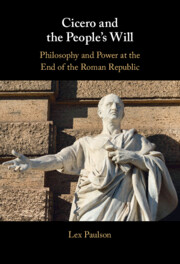Book contents
- Cicero and the People’s Will
- Cicero and the People’s Will
- Copyright page
- Dedication
- Contents
- Acknowledgments
- Abbreviations
- Introduction
- Part I The Practice of Voluntas
- Part II The Philosophy of Voluntas
- Chapter 6 Willpower
- Chapter 7 Free Will and the Forum
- Chapter 8 The Fourfold Self
- Conclusion
- Epilogue
- Appendix Occurrences of Voluntas in the Works of Cicero
- References
- Index
Chapter 8 - The Fourfold Self
from Part II - The Philosophy of Voluntas
Published online by Cambridge University Press: 24 November 2022
- Cicero and the People’s Will
- Cicero and the People’s Will
- Copyright page
- Dedication
- Contents
- Acknowledgments
- Abbreviations
- Introduction
- Part I The Practice of Voluntas
- Part II The Philosophy of Voluntas
- Chapter 6 Willpower
- Chapter 7 Free Will and the Forum
- Chapter 8 The Fourfold Self
- Conclusion
- Epilogue
- Appendix Occurrences of Voluntas in the Works of Cicero
- References
- Index
Summary
This chapter is dedicated to the theory of selfhood Cicero presents in the De officiis: each person being a player of four personae. The allegory of four dramatic roles or masks (from the Greek prosopon) is borrowed from the Stoic Panaetius, whose ethical theory adapts the stringent demands of the sage to a morally imperfect and multifarious public. He who wishes to progress, Cicero explains, must play the roles of reason, of nature, of fortune, and, finally, the role “we ourselves may choose sets forth from our will” (quam personam velimus, a nostra voluntate proficiscitur). In this final treatise, the will comes most clearly into view as a mental capacity and rational force. I argue that when read in conjunction with related uses of voluntas and persona in other texts, Cicero’s will serves a recursive purpose within each of the other personae. Whether in actualizing reason, refining our inborn qualities, or navigating the forces of necessity and civic duty, voluntas creates a dialectic of actor and mask from which emerges a conscious moral self. Though the will develops richly as a moral faculty and principium individuationis in the hands of later thinkers, its terrestrial purposes disappear as divine ones take hold.
Keywords
- Type
- Chapter
- Information
- Cicero and the People’s WillPhilosophy and Power at the End of the Roman Republic, pp. 186 - 217Publisher: Cambridge University PressPrint publication year: 2022

